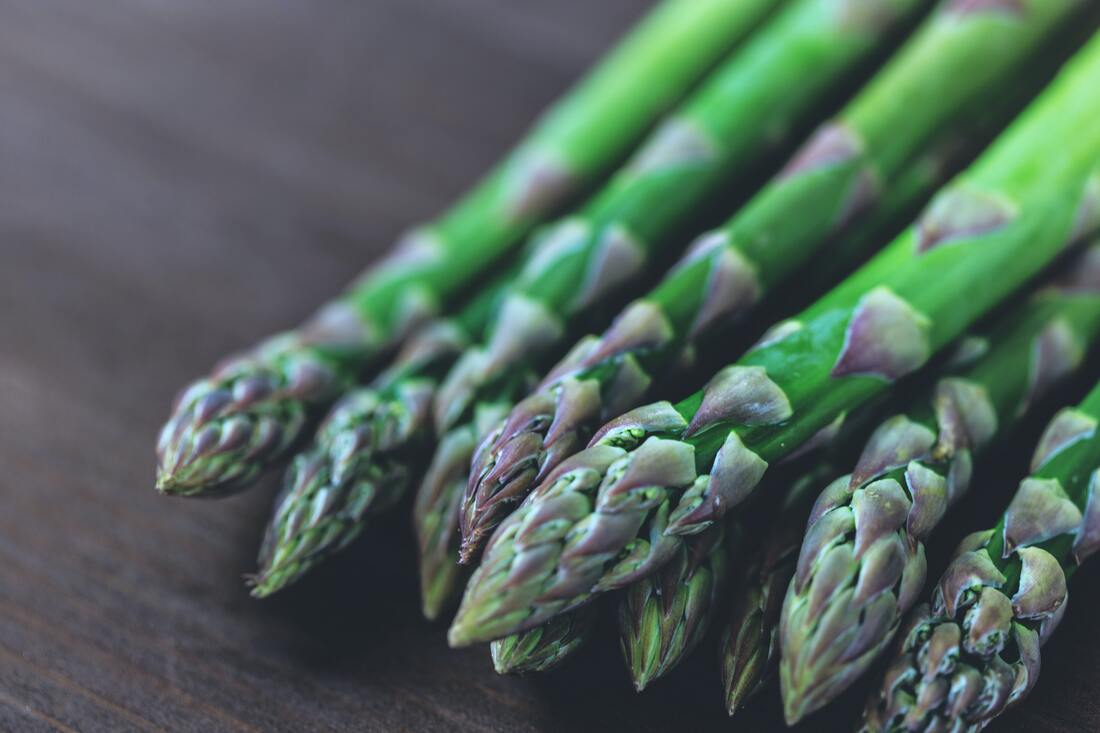
This vegetable is part of a great recovery meal for athletes because all of the trace minerals and composition of electrolytes. Adding a pinch of himalayan salt for flavour also adds beneficial sodium, in small amounts to the mix.
It's great for Digestive Health
Asparagus is known to help stabilize digestion due to the high amount of fibre and plant protein.
It contains inulin, a unique dietary fibre associated with improved digestion. Inulin is a prebiotic, which means that it does not get broken down and digested until it reaches the large intestine. Once there, it feeds good bacteria known to improve nutrient absorption, decrease allergies and reduce the risk of colon cancer. We can no longer say we are eating for 1, or eating for 2, we are eating for billions to keep us healthy and happy.
For Healthy Pregnancies
Asparagus has a significant amount of folate, which is important for women of childbearing age to consume daily. Folate can decrease the risk of neural-tube defects in fetuses, so it is essential that mothers-to-be get enough of it, the best way is through the food you eat and other foods naturally high in folate like broccoli, beans, peas and lentils, avocados, brussel sprouts, okra and citrus fruits.
Heart Health
Asparagus is good for your heart in a variety of ways. It has good amounts of vitamin K, and within it's growing research has great benefits to cardiac health including decreasing calcification, inhibiting calcification from occurring, and helping to reduce the risk of heart disease.
Asparagus among other vegetables high B vitamins helps regulate the amino acid homocysteine, too much of which can be a serious risk factor in heart disease.
This delicious vegetable contains more than 1 gram of soluble fibre per cup, which can lower risks of heart disease, and the amino acid asparagine helps flush your body of excess salt. Finally, asparagus has excellent anti-inflammatory effects and high levels of antioxidants, both may contribute to reduce the risk of heart disease.
Helps Stabilize Blood Sugar
Because B vitamins play a key role in the metabolism of sugars and starches, veggies that are high in these are critical for healthy blood sugar management. Paired with the fibre content that is known to slow digestion and stabilize blood sugars, asparagus's GI index is 15 (very low) it makes it a good choice of inclusion for anyone trying to stabilize the blood sugar.
A note and friendly reminder that healthy diet and lifestyle paths are very individual.
Asparagus and Purines
While most people don't have to worry about the amazing edible benefits of the plant world, some do. Asparagus contains naturally-occurring substances called purines. Purines are commonly found in animals, plants, and humans and in some individuals who are susceptible to purine-related problems, excessive intake of these substances can cause or aggravate health problems. Purines can be broken down to form uric acid, and excess accumulation of purines in the body can lead to excess accumulation of uric acid. The health condition called "gout" and the formation of kidney stones from uric acid accumulation are some examples of uric acid-related problems that can be aggravated by excessive intake of purine-containing foods. People with nephritis (kidney inflammation) may want to limit these foods. Everyone assimilates and evacuates food and nutrients differently, that's why no one diet is best for any one aliment or disease, or optimal health plan. Look within you, learn the tools, listen to your body, and navigate your path to vibrate health and wellness with a strong, supportive, knowledgeable health circle.
If you are interested in navigating your path to optimal health and wellness with a professional, contact us at Wild Seed Holistic Health, we are here to work with you and your individuality to create a path to health and wellness success.